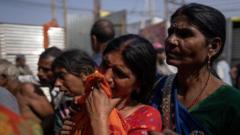Manmohan Singh, the first Sikh Prime Minister of India, known for his pivotal economic reforms, has passed away at the age of 92 in New Delhi, leaving behind a legacy as a key architect of modern India's economic landscape.
Manmohan Singh: The Economic Architect of Modern India Passes Away at 92

Manmohan Singh: The Economic Architect of Modern India Passes Away at 92
Former Prime Minister Manmohan Singh, credited with transforming India's economy, dies in New Delhi.
Manmohan Singh, renowned for his quiet demeanor and intellectual prowess, breathed his last on Thursday at the All India Institute of Medical Sciences. His passing was confirmed by Indian Prime Minister Narendra Modi, who expressed sorrow and regarded Singh as one of the nation's "most distinguished leaders." Singh held office from 2004 to 2014, leading coalition governments during a transformative period for India.
Born in what is currently Pakistan, Singh's early life experiences were shaped by the tumultuous events surrounding the partition of India in 1947. As the country's first prime minister from the Sikh community, he donned his characteristic powder-blue turban with pride. Singh’s journey towards political prominence began in 1991 when he was appointed as the finance minister. He implemented significant reforms that set India on a path towards economic liberalization, which saw it emerge as a competitive force in the region, alongside the likes of China.
Despite his achievements, Singh's tenure wasn’t without challenges. His government faced backlash during a period of stagnation in the economy and was embroiled in scandals involving telecommunications licenses and coal allocations. Despite his reserved nature, that often limited his public engagements, Singh's impact on India’s economy and international standing remains deeply etched in the history books. His passing marks the end of an era for a nation that greatly transformed under his leadership.




















